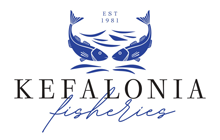What is the nutritional value of Sea Bass and Sea Bream?
Sea Bass and Sea Bream, both farmed and wild caught, have a very good nutritional profile, being highly recommended as a healthy, nutritious food choice:
Protein content: Sea Bass and Sea Bream are excellent sources of high quality protein, at a content of ~21% protein per gr fillet
Lipid content: Sea Bass and Sea Bream are rich in polyunsaturated fatty acids (the “good fats”) and low in saturated acids (the “bad fats”). In particular they are a good source of omega 3 fatty acids, which are beneficial to the human health.
Vitamins & Minerals: Sea Bass and Sea Bream are an important source of essential vitamins & minerals, namely soluble vitamins A & D, water soluble vitamins B1, B2, B3 & B12, and calcium, phosphorus, zinc and iodine.
| Percentage per 100 gr. fillet | Sea Bream | Sea Bass |
| Protein | 20.4 | 21.2 |
| Lipids | 5.7 | 4.4 |
| of which saturated acids | 1.3 | 1.1 |
| of which polyunsaturated acids | 1.9 | 1.5 |
| ω-3 fatty acids | 1.2 | 1.0 |
| EPA & DHA | 0.8 | 0.7 |
| ω-6 fatty acids | 0.7 | 0.5 |
| Carbohydrates | 0.2 | 0.2 |
| Kcal / 100 gr. fillet | 133 | 125 |
Especially Kefalonia Fisheries Sea Bass and Sea Bream demonstrate an optimal lipid profile as their EPA & DHA content per total gram fat is higher than a lot of other popular farmed fish species (e.g. salmon). This is achieved by raising the fish on higher quality fish feeds which have a higher content of these omega 3 fatty acids.
EPA & DHA are extremely important polyunsaturated fatty acids for the human health, as they are an integral part of our cell membranes, thus playing a very important role in all functions of the human body, and they cannot be composed by the body itself, thus need to be sourced through food, and most typically through seafood consumption. Numerous studies have shown that these are beneficial to the brain and eye health, protect against heart failure, atherosclerosis and thrombosis and relieve depression and fight cognitive decline.
A health claim has been approved by the European Food Safety Authority (EFSA) for farmed sea bass and sea bream which states that:
« Consumption of cultured sea bass and sea bream twice a week, as a rich source of Highly Unsaturated omega3 fatty acids (EPA, DHA) and as part of a healthy life style has been proven to assist in the maintenance of normal cardiac function, maintenance of normal blood pressure and maintenance of normal (fasting) blood triglycerides and blood LDL cholesterol concentrations. »
